|
|
|
Sort Order |
|
|
|
Items / Page
|
|
|
|
|
|
|
| Srl | Item |
| 1 |
ID:
140460
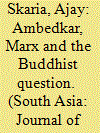

|
|
|
|
|
| Summary/Abstract |
This essay tries to frame one question, which at its most abbreviated can be posed thus: why does Ambedkar convert to Buddhism? Given Ambedkar's militant secularism, to ask this question is also to ask: what assumption of responsibility does that conversion enable which exceeds secular responsibility? This essay tracks how Ambedkar's religion questions both the liberal concept of minority, and the dissolution of the minor that is staged in Marx's critique simultaneously of religion and secularism. Buddhism becomes in the process a religion of the minor.
|
|
|
|
|
|
|
|
|
|
|
|
|
|
|
|
| 2 |
ID:
132273
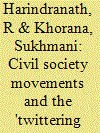

|
|
|
|
|
| Publication |
2014.
|
| Summary/Abstract |
Using Partha Chatterjee's insights on the formation of 'civil society' and how this is distinct from 'political society', this paper theorises the mobilisation of popular support via social media during the so-called 'anti-corruption movement' in India in 2011. It tracks the main themes of the civil society-led movement's Twitter feeds during two crucial phases of fasting by its self-proclaimed Gandhian leader, Anna Hazare. This highlights the mixing of nostalgic pre-independence discourses with new media savvy and provides a means of contextualising what such discursive mobilisation means for contemporary political formations in a post-colonial society such as India. The case study also sheds light on the urban- and middle-class-centred nature of the protest and its preference for media over electoral representation-this is in line with Chatterjee's conceptualisation of a civil society that undermines the authority of the state and excludes the rural and urban poor.
|
|
|
|
|
|
|
|
|
|
|
|
|
|
|
|
| 3 |
ID:
104550
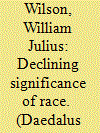

|
|
|
|
|
| Publication |
2011.
|
| Summary/Abstract |
Wilson reflects on the nearly eight hundred research studies that claim to provide an empirical test of the arguments presented in his book The Declining Significance of Race (1978; second edition, 1980). Wilson considers representative studies that incorrectly address his book, before discussing those publications that correctly address his thesis, including those that uphold, partially support, or challenge his arguments and basic claims. In the process, Wilson explores how some of these studies led him to revise or extend parts of his basic thesis, especially as it pertains to race and interracial relations today. Wilson also takes into account changes within the African American population since he wrote The Declining Significance of Race. He reveals how his thoughts have changed with respect to both race- and class-based solutions for the problems faced by people of color.
|
|
|
|
|
|
|
|
|
|
|
|
|
|
|
|
| 4 |
ID:
090906
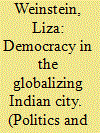

|
|
|
|
|
| Publication |
2009.
|
| Summary/Abstract |
Transformations under way in Indian cities have begun to alter the opportunities for democratic participation among the urban poor. Highlighting efforts to promote globally oriented urban developments in Mumbai, this article examines the state's engagement with groups directly impacted by these efforts. Based on ethnographic research and interviews with key stakeholders in the Dharavi Redevelopment Project (DRP), the article traces the character of such engagements over the project's four-year planning process. It finds that the state undertook an unusually inclusive process, consulting with resident and activist groups at points throughout this period. The article posits that this novel engagement is an unintended consequence of pressures to promote rapid development and ease investor concerns. Situating this case in the recent literature on political shifts in the globalizing Indian city, it concludes that the state may be engaging more with the urban poor than many of these accounts suggest.
|
|
|
|
|
|
|
|
|
|
|
|
|
|
|
|
| 5 |
ID:
108994
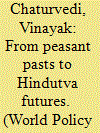

|
|
|
|
|
| Publication |
2011.
|
| Summary/Abstract |
This paper considers the participation and initiation of communities once classified as criminal tribes in the violence in Gujarat in 2002. Given that their descendants continue to suffer politically and economically in post-colonial India, it is necessary to examine the role of the marginalised and subordinate communities in the making of Hindutva in the twenty-first century. Building upon debates on violence in post-colonial societies, the paper examines the historical contexts for why victims often become killers in genocide. More specifically, it provides an analysis of one specific community of poor, low-caste peasants, the Dharalas, who participated in the violence against Muslims in Gujarat. The paper also examines the limits of historical methodology for the writing of histories of violence from 'below'.
|
|
|
|
|
|
|
|
|
|
|
|
|
|
|
|
| 6 |
ID:
133577
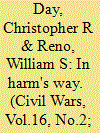

|
|
|
|
|
| Publication |
2014.
|
| Summary/Abstract |
This article explains why contemporary African regimes choose different counter-insurgency strategies and why they tend not to be population-centric. We argue that strategies correspond to the ways in which incumbent regimes in Africa deal with different segments of political society through patronage. Incumbents seek varying levels of accommodation with rebel leaders, or try to eliminate them, according to rebels' historical position within the state. This variation reflects differences in perceived political threats posed to incumbents. We classify these threats as high, moderate or low, which are associated with counter-insurgency strategies of group control, insurgent control and insurgent elimination, respectively.
|
|
|
|
|
|
|
|
|
|
|
|
|
|
|
|
| 7 |
ID:
080400
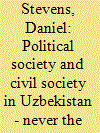

|
|
|
| 8 |
ID:
113203
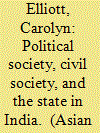

|
|
|
|
|
| Publication |
2012.
|
| Summary/Abstract |
This article is an ethnography portraying the processual and performative dimensions of the 2009 state assembly election in Andhra Pradesh. It shows how upper castes have persisted in power in a multicaste and increasingly democratic society through the distribution of welfare and patronage benefits to more marginalized segments of society. Conceptually, it argues for the importance of "political society" over "civil society," when examining state-society relations in neoliberal, democratic India.
|
|
|
|
|
|
|
|
|
|
|
|
|
|
|
|
| 9 |
ID:
039545
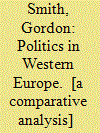

|
|
|
|
|
| Publication |
London, Heinenann Edcucational, 1972.
|
| Description |
xi, 403p.
|
| Standard Number |
0435837869
|
|
|
|
|
|
|
|
|
|
|
|
Copies: C:1/I:0,R:0,Q:0
Circulation
| Accession# | Call# | Current Location | Status | Policy | Location |
| 011589 | 320.940/SMI 011589 | Main | On Shelf | General | |
|
|
|
|
| 10 |
ID:
095060
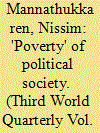

|
|
|
|
|
| Publication |
2010.
|
| Summary/Abstract |
Prominent postcolonial thinker Partha Chatterjee's concept of political society is an important one in understanding the vast domain of politics in the 'Third World' which falls outside hegemonic Western notions of the state and civil society. This domain, which is often marked by the stamp of illegality, nevertheless contributes to the immense democratic churning that characterises much of the 'Third World'. However, this paper argues that the series of binaries set up by Chatterjee, like modernity/democracy, civil society/political society and the privileging of the latter half of the binary is ultimately counterproductive to the goal of democratisation. Based on empirical research on the People's Plan Campaign in Kerala, one of the most extensive democratic decentralisation programmes in the world, it will argue that the extension of popular sovereignty requires that we go beyond political society. The failures and prospects of the Plan and the struggles around it demonstrate clearly the breakdown of the binary.
|
|
|
|
|
|
|
|
|
|
|
|
|
|
|
|
| 11 |
ID:
045511
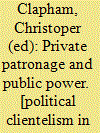

|
|
|
|
|
| Publication |
London, Frances Pinter Publishers, 1982.
|
| Description |
vi, 222p
|
| Standard Number |
0861872231
|
|
|
|
|
|
|
|
|
|
|
|
Copies: C:1/I:0,R:0,Q:0
Circulation
| Accession# | Call# | Current Location | Status | Policy | Location |
| 022857 | 306.2/PRI 022857 | Main | On Shelf | General | |
|
|
|
|
| 12 |
ID:
190820
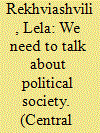

|
|
|
|
|
| Summary/Abstract |
This article points out the need to talk about the political society, or the politics and resistances, of subaltern groups in Eastern Europe and Eurasia. Existing literature frames diversity marginalized struggles as civil society struggles or decries the weakness of donor-driven, disembedded civil societies, reproducing the understanding of political life in the region in terms of absences, voids and deficiencies. Challenging this subsumption or dismissal of subaltern struggles, I advance two arguments. First, I argue against broadening the civil society concept to include various subaltern struggles as this approach risks overwriting differences between those groups that mobilize as rights-bearing citizens and the ones that are not recognized or treated as civil society. Instead, I propose acknowledging the historically and spatially contingent character of civil society and the defining role of the state and other actors in shaping which struggles fall within or beyond institutional and discursive frameworks of legality and legitimacy. Second, I argue that Patra Chatterjee’s concept of ‘political society’ can serve better as a meta-vocabulary to account for a diversity of struggles shunted as backwards, premodern and uncivilized, and to refocus research from what is absent to what is present, towards understanding counter-hegemonic discourses and practices.
|
|
|
|
|
|
|
|
|
|
|
|
|
|
|
|
| 13 |
ID:
132272
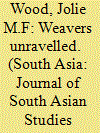

|
|
|
|
|
| Publication |
2014.
|
| Summary/Abstract |
A comparative study of mobilisation by two lower-class occupational groups in Varanasi, India, presents a puzzle: one group, the boatmen of the Mallah community, have successfully formed and sustained several associations to promote boatmen's occupational interests, whereas another group, the handloom weavers of the Ansari community, have no self-formed, durable, active associations. This paper argues that transformation and decline of the weaving industry and significant class divisions within a community that continues to be highly marginalised have left the handloom weavers particularly vulnerable and pose steep challenges to self-organisation.
|
|
|
|
|
|
|
|
|
|
|
|
|
|
|
|
|
|
|
|
|